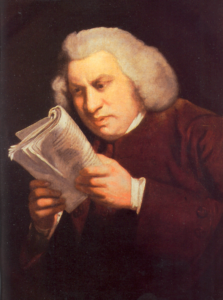I gave a little talk at my church the other night about one of my favourite folk, a man before whose altar I daily offer my admiration, my gratitude, and the still-pumping heart of one of the indentured servants on my estate who has grown old and whose existence would otherwise serve no purpose. I refer, of course, to Dr Samuel Johnson, late of Lichfield and London, writer, thinker, talker; foe to hypocrisy, liberals and Americans; friend to corporal punishment, learning and prayer.
Since Christmas is fast approaching, I am going to quote from a sermon the Great Man wrote on the necessity of charity.
This was written over 50 years before Charles Dickens created the character of Ebenezer Scrooge but observe how closely Johnson’s description and Scrooge’s life and personality coincide:
When any man… has learned to act only by the impulse of apparent profit, when he can look upon distress, without partaking it, and hear the cries of poverty and sickness, without a wish to relieve them; when he has so far disordered his ideas as to value wealth without regard to its end, and to amass with eagerness what is of no use in his hands; he is indeed not easily to be reclaimed; his reason, as well as his passions, is in combination against his soul, and there is little hope, that either persuasion will soften, or arguments convince him. A man, once hardened in cruelty by inveterate avarice, is scarcely to be considered as any longer human; nor is it to be hoped, that any impression can be made upon him, by methods applicable only to reasonable beings. Beneficence and compassion can be awakened in such hearts only by the operation of divine grace, and must be the effect of a miracle, like that which turned the dry rock into a springing well.
Scrooge was indeed fortunate that such a miracle, or rather a whole series of miracles, intervened and turned the dry rock of his soul into a springing well. But few of us will be frightened into a change of heart by ghostly visitations. Why therefore should we become dispensers of charity? Listen closely, because Johnson is speaking on this very subject:
The chief advantage which is received by mankind from the practice of charity, is the promotion of virtue amongst those who are most exposed to such temptations as it is not easy to surmount: temptations of which no man can say that he should be able to resist them, to estimate the force, and represent the danger.
We see every day men blessed with abundance, and revelling in delight, yet overborne by ungovernable desires of increasing their acquisitions; and breaking through the boundaries of religion, to pile heaps on heaps, and add one superfluity to another, to obtain only nominal advantages and imaginary pleasures.
For these we see friendships broken, justice violated, and nature forgotten; we see crimes committed, without the prospect of obtaining any positive pleasure, or removing any real pain. We see men toiling through meanness and guilt, to obtain that which they can enjoy only in idea, and which will supply them with nothing real which they do not already abundantly possess.
Did you get that? The chief beneficiary of charity is the giver! It saves him from becoming someone he should not want to be — someone insensitive to what is truly important and a slave to an obsession that will bring him only meanness of spirit. We often see a character on television cry with an impassioned sneer: “I don’t need your charity!”Perhaps not. But we need to give it.
